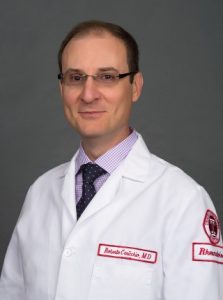
Dr. Caricchio
Roberto Caricchio, MD, Now Chief of Rheumatology at UMass Chan Medical School
As of July 1, Roberto Caricchio, MD, began a new appointment as chief of the Division of Rheumatology at UMass Chan Medical School, Worcester. He was formerly chief of the Section of Rheumatology at Lewis Katz School of Medicine at Temple University, Philadelphia, where he was also a professor of medicine, microbiology and immunology, as well as director of the Temple Lupus Program. Dr. Caricchio has also been named the Myles J. McDonough Chair in Rheumatology, a position formerly held by past ACR President Ellen M. Gravallese, MD, who is now chief of the Division of Rheumatology, Inflammation and Immunity at Brigham and Women’s Hospital, Boston.
We spoke with Dr. Caricchio during the transitional period between his acceptance of the new assignment and his move to Worcester. Dr. Caricchio’s major interest in lupus will remain, but he is also going to have the opportunity to foster the growth of other physician-scientists, “a part of my career that is dear to me.”
With palpable excitement, he explained that moving to UMass meant joining a medical institution entrenched in research. He will be among numerous physician-scientists—including David D. McManus, MD, chair of medicine and a leading authority in cardiovascular digital health, and Terence R. Flotte, MD, the provost, dean and executive deputy chancellor, who is an internationally known scientist in molecular therapeutics. The proximity of so many other physician-scientists will foster “the type of discussions and interactions that are what a physician-scientist needs,” says Dr. Caricchio.
Clinical opportunities will also abound. His vision includes developing streamlined mechanisms to decrease wait times for patients with severe disease, growing a strong lupus program, offering patients the opportunity to join clinical trials and expanding translational research. Building the multidisciplinary clinics will also be part of the mix, he says, because it has been established that rheumatology patients who have joint access to other disciplines, such as nephrology, pulmonology and dermatology, experience better quality of care.
Dr. Caricchio will be passing the baton for work on a major study conducted while he was a core member of Temple University Hospital’s COVID-19 Response Team. He spearheaded the development of a new strategic therapeutic approach to treating patients with coronavirus inflammatory response and predictors of poor outcome.1 Of that effort, Dr. Caricchio says it was both “professionally and scientifically spectacular, but from a human point of view, seeing so many individuals succumb to a disease at one time … was terrible.”
Dr. Caricchio obtained his medical degree from the Catholic University of Sacred Heart in Rome, and moved to the U.S. in 1996 to pursue a research fellowship at the University of North Carolina at Chapel Hill. A research faculty appointment at the Perelman School of Medicine at the University of Pennsylvania, Philadelphia, and a residency and additional fellowship at Temple University followed.
His wife and collaborator, immunologist Stefania Gallucci, MD, joins him at UMass, with an appointment as professor in the Division of Innate Immunity, directed by Katherine A. Fitzgerald, PhD.
N.J. Rheumatologist Rita Komboz, MD, Adds Fiction Authorship to Her Credits

Dr. Komboz
Rita Fares Komboz, MD, FACR, who has been in private practice as a rheumatologist in Belleville, N.J., for 23 years, found that she had a little more time on her hands when the COVID-19 pandemic necessitated the nationwide shutdown in spring 2020. She began a personal project that developed into the publication of a fanciful children’s book, Corky the Cat.
Dr. Komboz drew her inspiration about the book’s character from her own rescue cat. She made Corky a fashion designer. The book’s narrative follows the plucky cat from her rise as a fashion designer at Vogue, through a coronavirus-caused career derailment and ultimate triumph over difficult circumstances. To accompany the text, Dr. Komboz composed color-saturated illustrations on her iPhone 7. She had originally thought to self-publish, but instead contacted Page Publishing, which printed the book in the U.S. The book is now available through Amazon, Barnes & Noble and other bookstores.
Coming of age in Lebanon during that country’s civil war, Dr. Komboz recalls that she was drawn to medicine because she “wanted to make a difference.” She obtained her medical degree from Université Saint-Joseph Faculté de Médecine, Beirut, in 1991.
She and her husband, a cardiologist, later emigrated to the U.S., where she finished an internship in Newark, N.J., and then a rheumatology fellowship in Philadelphia in 1999 at Allegheny Health Network. She recalls her fellowship coincided with the release of TNF inhibitors, such as etanercept, which was a game-changer in the treatment armamentarium for patients with rheumatoid arthritis.
Dr. Komboz is a rheumatologist with Arthritis and Osteoporosis Associates, Belleville, N.J., and is also affiliated with Clara Maass Medical Center, also in Belleville.
She has plans for a Corky the Cat sequel, and the protagonist may find herself a rheumatologist in her second life.
Richard S. Panush, MD, Recipient of 2022 AAIM-APDIM Distinguished Medical Educator Award
During Academic Internal Medicine Week 2022, sponsored by the Alliance for Academic Internal Medicine (AAIM), April 10–13, Richard S. Panush, MD, MACP, MACR, received the Distinguished Medical Educator Award from the Association of Program Directors in Internal Medicine. Dr. Panush is a professor of medicine emeritus, Division of Rheumatology, Keck School of Medicine at the University of Southern California, Los Angeles.
As early as his third year of medical school at the University of Michigan, Ann Arbor, Dr. Panush found that rheumatology “posed some of the most interesting and challenging clinical and investigative questions in medicine.” His influences included the late Giles Bole, MD, a former dean of the medical school and past president of the ACR; the late C. William Castor, MD; the late James B. Wyngaarden, MD, who was the residency chair at Duke University, Durham, N.C., during Dr. Panush’s time there, and subsequently director of the National Institutes of Health (NIH); and William N. Kelley, MD, MACP, “when he had just come to Duke as this a bright young rheumatologist from the NIH.” Dr. Kelley is another ACR past president and current professor of medicine at the University of Pennsylvania.

Dr. Panush
Dr. Panush cites other important influences from his rheumatology fellowship at the Robert Breck and Peter Bent Brigham Hospitals (now known as the Brigham and Women’s Hospital, Boston): Peter H. Schur, MD, professor of medicine, Brigham and Women’s Hospital, and K. Frank Austen, MD, the AstraZeneca Professor of Respiratory and Inflammatory Diseases at Harvard Medical School.
Dr. Panush’s multi-faceted career has included academic appointments at the University of Florida College of Medicine, Gainesville; Saint Barnabas Medical Center, Livingston, N.J.; University of Medicine and Dentistry, New Jersey Medical School, Newark; and Mount Sinai School of Medicine, N.Y.
Throughout his career Dr. Panush has maintained a passionate interest in the interface of medicine with the humanities; he has studied and written extensively about this. As the chair of the ACR’s Ethics Committee, Dr. Panush played a critical role in helping identify Nazi physicians who had been recognized with eponymic honors and having their names removed from the diseases with which they had been associated. They should be remembered “in obloquy and shame for their violation of transcendent ethical and moral responsibilities,” he says.
Dr. Panush was a residency or fellowship program director for 40 of his 50 years in academic medicine, and division chief or department chair for 35. “At some point in your career, you realize it’s not about you,” he says. “It’s about the program you’re in, and the organization and community you represent. What’s important is how you influence others, how you support them in their careers and how you try to make people, programs, rheumatology and our world better.”
Of his recent recognition by the AAIM, he says that “at this time in my life and career, this is a humbling honor indeed.”
Gretchen Henkel is a health and medical journalist based in California.
Reference
- Caricchio R, Abbate A, Gordeev I, et al. Effect of canakinumab vs placebo on survival without invasive mechanical ventilation in patients hospitalized with severe COVID-19: A randomized clinical trial. JAMA. 2021 Jul 20;326(3):230–239.


